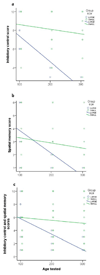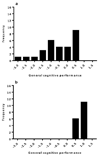Cognitive performance is linked to group size and affects fitness in Australian magpies
- PMID: 29414945
- PMCID: PMC5815499
- DOI: 10.1038/nature25503
Cognitive performance is linked to group size and affects fitness in Australian magpies
Abstract
The social intelligence hypothesis states that the demands of social life drive cognitive evolution. This idea receives support from comparative studies that link variation in group size or mating systems with cognitive and neuroanatomical differences across species, but findings are contradictory and contentious. To understand the cognitive consequences of sociality, it is also important to investigate social variation within species. Here we show that in wild, cooperatively breeding Australian magpies, individuals that live in large groups show increased cognitive performance, which is linked to increased reproductive success. Individual performance was highly correlated across four cognitive tasks, indicating a 'general intelligence factor' that underlies cognitive performance. Repeated cognitive testing of juveniles at different ages showed that the correlation between group size and cognition emerged in early life, suggesting that living in larger groups promotes cognitive development. Furthermore, we found a positive association between the task performance of females and three indicators of reproductive success, thus identifying a selective benefit of greater cognitive performance. Together, these results provide intraspecific evidence that sociality can shape cognitive development and evolution.
Conflict of interest statement
The authors declare no competing financial interests.
Figures









Comment in
-
Brainpower boost for birds in large groups.Nature. 2018 Feb 15;554(7692):303-304. doi: 10.1038/d41586-018-01487-3. Nature. 2018. PMID: 29446385 No abstract available.
References
-
- Humphrey N. In: Growing Points in Ethology. Bateson PPG, Hinde RA, editors. Cambridge Univ. Press; 1976. pp. 303–317.
-
- Byrne RW, Whiten A. Machiavellian intelligence: Social Expertise and the Evolution of Intellect in Monkeys, Apes, and Humans. Clarendon press; 1988.
-
- Bond AB, Kamil AC, Balda RP. Social complexity and transitive inference in corvids. Anim Behav. 2003;65:479–487.
Publication types
MeSH terms
Grants and funding
LinkOut - more resources
Full Text Sources
Other Literature Sources

